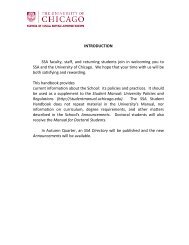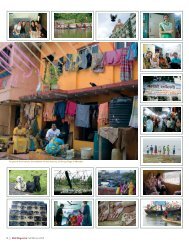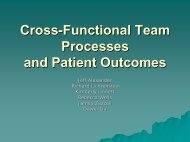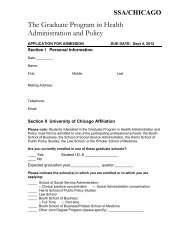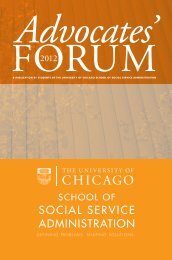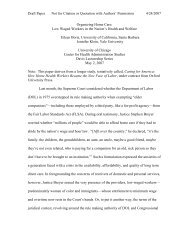2006 - School of Social Service Administration - University of Chicago
2006 - School of Social Service Administration - University of Chicago
2006 - School of Social Service Administration - University of Chicago
Create successful ePaper yourself
Turn your PDF publications into a flip-book with our unique Google optimized e-Paper software.
Advocates’ Forum<br />
Each <strong>of</strong> these factors liberates members involved in the decision-making<br />
process to think outside the box without being preoccupied with status or<br />
adherence to a particular role.<br />
The clearest examples <strong>of</strong> decentralization and lack <strong>of</strong> formalization in an<br />
organization can be observed in GRRL Theater. As part <strong>of</strong> a collective,<br />
members <strong>of</strong> the troupe are all equal participants in the discussions concerning<br />
transgender inclusion. Additionally, GRRL Theater has no board <strong>of</strong> directors<br />
to make decisions about transgender inclusion and no advisory panel to make<br />
suggestions to the group. Therefore, there is no formal structure imposed on<br />
the process <strong>of</strong> decision making. Adhering to the model proposed by Pierce and<br />
Delbecq (1997), this structure makes GRRL Theater more likely to consider<br />
innovative changes that could drastically alter the group and have broad<br />
ramifications in the feminist arena.<br />
Although each studied organization exhibits a relatively low level <strong>of</strong><br />
formalization, certain groups are more structured than others. In particular,<br />
The Toybox, a pr<strong>of</strong>it-driven organization, runs like any other retail business.<br />
It includes salespeople, managers, and owners; these roles are organized<br />
hierarchically. The greater degree <strong>of</strong> structure at The Toybox, in comparison<br />
to the levels <strong>of</strong> structure in the other organizations, provides a possible<br />
explanation for why the inclusion <strong>of</strong> transgendered staff was not as radical<br />
there as it was or could have been in the other groups. Sarah, one <strong>of</strong> the<br />
founders <strong>of</strong> the store, indicates that there was a general lack <strong>of</strong> conflict concerning<br />
the change in policy. She notes that the policies before and after inclusion<br />
were largely un<strong>of</strong>ficial. Because employees are stratified, it was possible for staff<br />
members to accept the policy shift as something in which they had limited<br />
input. For these reasons, transgender inclusion at The Toybox was not so much a<br />
radically innovative decision but rather a gradual, minimally contested evolution.<br />
ATTITUDES OF MEMBERS. Members <strong>of</strong> the groups in this study consistently<br />
refer to their organizations as leaders to which other groups look for indications<br />
about feminism’s evolution. To continue as leaders in the field, these groups<br />
must value the development <strong>of</strong> groundbreaking ideas. According to Pierce and<br />
Delbecq, a “value <strong>of</strong> innovation and creative behavior is seen as playing a<br />
critical role in an organization’s effective utilization <strong>of</strong> innovative capacity”<br />
(1977, p. 33). In other words, when organizations value and encourage innovative<br />
ideas, members are likely to develop them. The import that these groups<br />
place on being noted leaders among feminists stimulates progressive thought,<br />
leading to innovative organizational changes.<br />
In describing the development <strong>of</strong> her store’s reputation, Sarah relates how<br />
other proprietors <strong>of</strong> sex shops have come to “follow [The Toybox’s] lead a<br />
42







